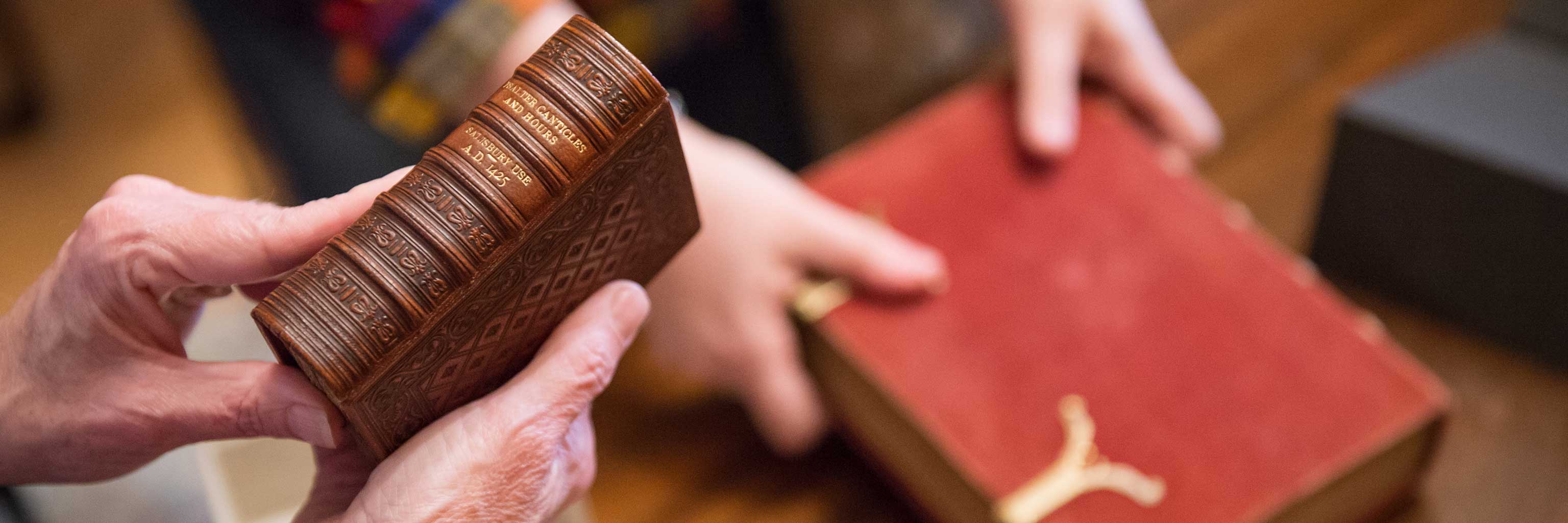In addition to the interdisciplinary and archival courses offered by our institute, a full schedule of medieval courses is offered in other participating academic departments. Approximately 65 medieval courses are offered here each year, not including the many courses in language instruction and independent research that student medievalists frequently take. Many students participate in medieval studies courses without enrolling in our formal degree programs. Courses that can count toward the medieval studies minor or certificate may not be listed below, reach out to mest@iu.edu with questions.
Courses
Spring 2026 Courses
Illuminated Manuscripts in the Middle Ages (3 credits)
ARTH-A 520 with Diane Reilly
From the fourth century CE, European artists created elaborate decorations and illustrations in manuscripts of sacred and secular texts. Starting with the invention of the codex in the first century, and continuing to the end of the Middle Ages, this course will investigate the tools, methods, and inspiration behind the creation of the medieval manuscript. We will survey the development of manuscripts used by Jewish, Christian, and Muslim communities of Europe, their appearance, functions and audiences, and learn about technological, philological, iconographical approaches to analysis. This class will take place online and take advantage of the many full digitization of manuscripts now available from their host institutions.
Medieval Performance Practice (2 credits)
MUS-M 517 with Dana Marsh
The basic literature of the Medieval period with performance-oriented analysis, survey of original sources, and study of performance-related theoretical works.
Mongolia’s Middle Ages
CEUS-R 561 with Michael Brose (3 credits)
Examination of Mongolia's "Middle Ages" between the Mongol world empire and the modern era, 1350 to 1850. Topics include the nobility, Oirats, Buddhist conversion, Manchu-Chinese rule, and Buriats and Kalmyks in Russia. Readings include modern histories and sources in translation.
Seminar in Germanic Linguistics (3-4 credits)
GER-G 835 with Christopher Sapp
This course investigates language contact between the early Germanic languages and neighboring languages. We will read and evaluate scholarship on the purported contact between proto-Germanic and various other families, language contact in the late classical period, and then focus most of our time on the Middle Ages. Final research projects may be conducted on linguistic or cultural contact between any languages of the student’s choosing (including non-Germanic). No knowledge of any Germanic language other than English is required.
The Beowulf Manuscript: Texts and Contexts (4 credits)
ENG-L 742 with Joey McMullen
Building on the basic grammar and language skills learned in first-semester Old English, this course will study the texts of Cotton Vitellius A xv’s Nowell Codex: The Life of Saint Christopher, the Wonders of the East, the Letter of Alexander to Aristotle, Beowulf, and Judith. From monster-slaying and heroic feats to pagan burials and betrayals, the contents of this manuscript take the reader far from pre-Conquest England to boundaries of the known world. Weekly translation will be supplemented with literary criticism to consider different aspects of the manuscript each week, including scholarship on individual texts, paleography, the artistry of poetic language and meter, Germanic and heroic legend, orality, material culture reception history, and even popular culture representations. By the end of the semester, we will have experienced—both first-hand in the Old English lines and second-hand through various contexts—what makes this codex so memorable.
Travelers and Explorers in Central Asia (3 credits)
CEUS-R 511 with Ron Sela
This course charts the exploration of Central Asia (from China to Iran) in the eighth through nineteenth centuries as a gateway to this fascinating but under-studied region. Using primary sources in English translation, we will evaluate these travelogues as sources, comparing and contrasting medieval and modern, insider and outsider, perspectives.

 The College of Arts
The College of Arts